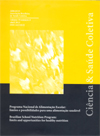1677/2012 - Dairy products intake by adults and elderly in the South of Brazil: a population-based study
Consumo de leite e derivados entre adultos e idosos no Sul do Brasil: um estudo de base populacional
Author:
• Ludmila Correa Muniz - Muniz, L.C - Pelotas, RS - Programa de Pós-Graduação em Epidemiologia, Universidade Federal de Pelotas - <ludmuniz@yahoo.com.br>ORCID: https://orcid.org/0000-0002-4270-7704
Co-author(s):
• Samanta Winck Madruga - Madruga, S.W. - Departamento de Nutrição, Universidade Federal de Pelotas - <samantamadruga@gmail.com>• Cora Luiza Araújo - Araújo, C.L. - Departamento de Nutrição, Universidade Federal de Pelotas - <cora.araujo@terra.com.br>
Thematic Area:
Alimentação, Nutrição e SaúdeAbstract:
It is a population-based cross-sectional study that evaluated the frequency of dairy products intake according to demographic and socioeconomic characteristics by adults and elderly in Pelotas (RS).Frequency of dairy products intake was obtained by means of a questionnaire containing short, simple questions. Information about the type of milk (cow’s milk, soy, other) and the fat contained in the milk consumed (whole, semi skimmed and skimmed) were also investigated. Heterogeneity and linear trend chi-square were used for the statistical analysis. The prevalence of daily dairy products intake was of 45.9% (95%CI: 42.8; 48.9), and was 1.7 times higher in the elderly individuals as compared to 20-29-year-olds. Frequency of dairy products intake was higher among women (51.4%), individuals with skin color white (49%) and higher school education (62.9%). Economic level was significantly and inversely associated whit the outcome. Nearly 98% of the sample takes milk cow and, 75.5% take whole milk. About 26% of the adults do not take milk and, among these less than 20% daily consume dairy products. Dairy products intake, especially with low-fat should be encouraged among adults. Special attention should be given to younger individuals, males, and groups with lower education and income.











